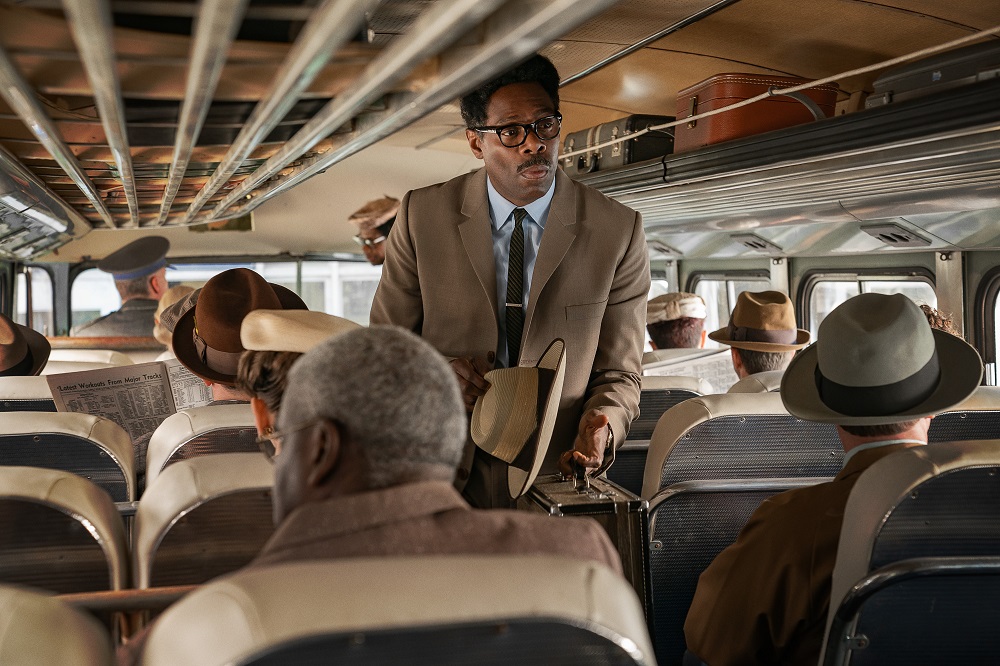
Naomi Ishisaka
The Seattle Times
SEATTLE — When people think of the 1963 March on Washington, it’s the Rev. Dr. Martin Luther King Jr.’s “I Have a Dream” speech that first comes to mind.
The speech, often the only one of MLK’s that people can quote, has become mainstream. His words are even now routinely used by conservatives to argue for what they call “colorblind” policies that aim to roll back civil rights and racial justice efforts.
But before King stood on that stage, visionaries and organizers had to build it. No one was more pivotal to that effort than Bayard Rustin.
Thanks to “Rustin,” a new Netflix film made almost 40 years after his death in 1987, Rustin is finally getting the wider public recognition he deserved in life.
The film opens with a haunting piano rendition of the freedom song “This Little Light of Mine” juxtaposed against the powerful scene of a steel-eyed Black woman who, as the camera pulls back, you realize is integrating a lunch counter while ketchup delivered by white antagonists drips down her face.
The film is mostly set in 1963 after the nation watched in horror as Birmingham police commissioner Bull Connor let loose dogs and fire hoses on protesters in Alabama. The movie was produced by Michelle and Barack Obama and follows Rustin — played by an extraordinary Colman Domingo — as he works to fulfill the vision of legendary labor rights leader A. Philip Randolph to bring 100,000 people from civil rights, labor and faith groups to the national mall to fight for “Jobs and Freedom” as the march was named.
Rustin, a skilled organizer, leader and logistical genius, had the talents to organize the march but was nearly sidelined by those who felt he had one liability too scandalous to ignore: He was gay.
Unlike so many in his time, Rustin was an openly gay man at a time when homosexuality was illegal in the U.S. Raised by Quaker grandparents, when he told his grandmother he was gay, she reportedly said “I suppose that’s what you need to do,” Henry Louis Gates Jr. wrote for PBS.
But the rest of the world was not so sanguine.
His sexual orientation was weaponized by opponents who used it as a way to marginalize his political efforts and undercut his work.
In one instance, U.S. Rep. Adam Clayton Powell — who was angry about a planned march outside of the Democratic National Convention — threatened to tell the media that Rustin and King were in a romantic relationship unless King distanced himself from Rustin. The accusation was not true, but the mere insinuation would have had dire consequences for the civil rights movement as a whole. Under threat, King acquiesced to Powell’s demands and pulled away from Rustin, who was until then a dear friend. (They would later reconcile and organize the march.)
This pattern repeated itself throughout Rustin’s life, which is one of the reasons former President Obama said most people have never heard of him. At a film screening, Obama said, “This is someone who was courageous enough to be who he was despite the fact that he was most certainly going to be ostracized, fired from jobs, pushed aside. And that’s what happened most of the time.”
Ultimately, the march brought not 100,000 but 250,000 to the mall, and Rustin wouldn’t leave until every piece of trash was picked up.
In 2013, Obama posthumously awarded Rustin a Presidential Medal of Freedom, which was accepted on Rustin’s behalf by his partner.
Rustin’s story made me reflect on all the heroes that have gone unacknowledged and unrecognized.
LGBTQ+ people, of course, but also women of all backgrounds, who were often the brains and hands behind so many movements for justice yet were relegated to the background, not their rightful place onstage. That was true, too, of the March on Washington, where the lone woman on the organizing committee had to fight to get any speaking roles at all for women. In the end, civil rights activist Daisy Bates ended up being the woman with the most speaking time.
How many of those women have been left out of our history?
And are there contemporary issues where people who are most impacted are missing a seat at the table where their future is being decided? For example, are young people — who will bear the brunt of inaction on climate change — shaping the policies that will affect them the most?
It’s great to see stories like Rustin’s told in all its complexity but better would be to give people their flowers when they are alive to receive them.
Instead of waiting for deeply contentious historical events to become sepia-toned, halcyon memories where people who were diametrically opposed to the cause at the time pretend to have always been in support, how can we be bolder and braver in the moment, like Rustin was, to rise to our most principled selves when it can still make a difference?
Also it matters how we make change as much as what change we make. As writer and poet Audre Lorde said, “The master’s tools will never dismantle the master’s house.”
Rustin said it this way, “We must remember that we cannot hope to achieve democracy and equality in such a way that would destroy the very kind of society which we hope to build. If we desire a society of peace, then we cannot achieve such a society through violence. If we desire a society without discrimination, then we must not discriminate against anyone in the process of building this society.”
_________
(Naomi Ishisaka is The Seattle Times’ assistant managing editor for diversity, inclusion and staff development.)
©2023 The Seattle Times. Visit seattletimes.com. Distributed by Tribune Content Agency, LLC.

